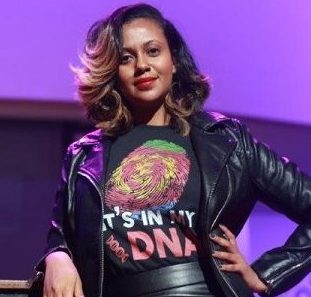This month’s professional spotlight features Heaven Berhane, Associate Minister for Community Engagement at First Corinthian Baptist Church NYC. Read this month’s spotlight to learn more about Heaven, her work, and her path to becoming a minister.
Could you briefly explain some of your responsibilities in your career role?
In my current role as the Associate Minister for Community Engagement at FCBC NYC, my responsibilities range based on my administrative & pastoral duties. In my capacity administratively, I oversee and support all of the community initiatives based here at the church. These initiatives allow us to engage & make an impact within the local Harlem community. Some of these are, but not limited to, our free clothing mall that services over 1000 people here in Harlem. Additionally, I’m tasked with building relationships with community, business & political stakeholders to facilitate their resources back into the community and to those most vulnerable.
Furthermore, I develop programming that meets the needs of those that attend our church; these programs are demographic focused and help to foster and build relationships within the FCBC community. In regards to my pastoral duties, I assist our pastoral team in preaching, participating in Sunday service and teaching. On any given week I could be asked to preach for our Sunday services. Beyond the Sunday service, I have responsibilities to facilitate and teach the congregation during our weekly bible study on a range of theological topics.
What inspired your career path?
Many things inspired my career path; I grew up in church, and my parents early on instilled and modeled for me the importance of faith & a strong belief in God. Interestingly enough, when I was in middle school my mother would jokingly call me Pastor Heaven. Of course at that time, I had no inclination or desire to become a Pastor; my dream job was to be a sports commentator on ESPN. So when people inquire about my inspiration, it’s as simple as I felt a call that I was on the path to be in ministry and a pastor. This call was in large part propelled by the deep love that I have for humanity and a strong desire to see a just world. I carry a strong belief that somehow, God compels each one of us to do our part in loving on the broken and the wounded.
What was your approach to following your career path?
My approach has primarily been me leaning on spiritual discernment and wise counsel. That has helped me to strategically consider how each decision would walk me closer toward my purpose. My approach has always been how I can bring my full self to the work that God has called me to do.
Is there a philosophy that drives your work as a minister?
There is a quote & scripture that undergirds and drives my philosophy as a minister. The first a quote from James Baldwin, “If the concept of God has any validity or any use, it can only be to make us larger, freer, and more loving. If God cannot do this, then it is time we got rid of Him.”
My scripture is Luke 4:18, “The Spirit of the Lord is on me, because he has anointed me to proclaim good news to the poor. He has sent me to proclaim freedom for the prisoners and recovery of sight for the blind, to set the oppressed free”.
My philosophical and theological beliefs are rooted in a desire to follow the modeled life of Jesus, and it didn’t necessarily fit within the constructs of organized religion. However, Jesus, at the core of his ministry, was rooted in love and a desire to see people live full lives. As a result, conceptually God is commanding that the church and ministers like myself love people to be who they are freely. Most importantly, I see everyone that I encounter as being made in the divine image of God, and as a result, my ministry becomes that of love, truth & justice. My work is grounded in a strong belief that I am responsible for addressing social issues and placing myself in proximity to those on the margins.
Lastly, because I possess the theological belief that God cannot be confined to the church. As a spiritual leader, I am not limited in my thinking of who God is and what God can do. This approach helps me to facilitate dialogue around culture & spaces that are not deemed “holy” by the churches standards, and yet there is something spiritual happening.
How has your Eritrean identity influenced your ministry work?
My Eritrean identity is at the foundation of who I am as a Minister. Being raised in an Eritrean church and witnessing firsthand how my cultural roots infused in the worship experience. To now working at a church that is predominately African American, I preach from the lens of being an Eritrean-American woman as well as Black woman. I’ll often share stories in my sermon of what it was like growing up Eritrean and or cultural norms. Sometimes I’ll share a phrase with them in Tigrinya. Additionally, carrying the immigrant narrative is something I share in that space as well. I shed light on our experiences, both positive and negative, and how we utilize our faith to guide our lives.
How does intersectionality show up in your work?
Intersectionality is at the foundation of my work. Working in the ministry, you encounter the everyday realities of people. So when you’re in the pulpit or counseling individuals, you address what’s happening culturally, speaking to mental health, issues on race, gender politics, business, technology, trends and so much more. Furthermore, as a licensed clinician, I see the importance of how mental health shows up in the church, and I’m grateful I work with a Pastor that values that. Overall, everything I do intersects with the world around me, and so it’s my job to ensure that the church remains culturally relevant.
What do you consider to be your greatest professional accomplishment?
My greatest professional accomplishment was when I worked with immigration rights organizations based here in NYC (New Sanctuary Coalition) as their faith coordinator. I helped to organize thousands of faith leaders from all backgrounds nationally to respond to the crisis at the border. I was able to take clergy to the border and see firsthand how broken our immigration system is. For me, that was the highest form of ministry I could have ever participated in.
What tips or advice would you offer anyone looking to follow a similar career path?
To someone who was looking to enter my career path, I would first instruct them to spiritually discern if this was the work God had called them. Secondly, I would encourage them to receive theological training and be open to learning new things and having your faith deconstructed and reconstructed afterward.
Outside of all of your hard work and efforts toward building your brand, what do you do for fun? Hobbies?
The work that I do is often both spiritually, emotionally, and physically taxing. So for me, self-care is vital, and for fun I enjoy hanging with my friends, kicking back and watching sports.
Additionally, traveling is my favorite hobby, but mostly, I like to kick back and binge-watch a good Netflix show.

